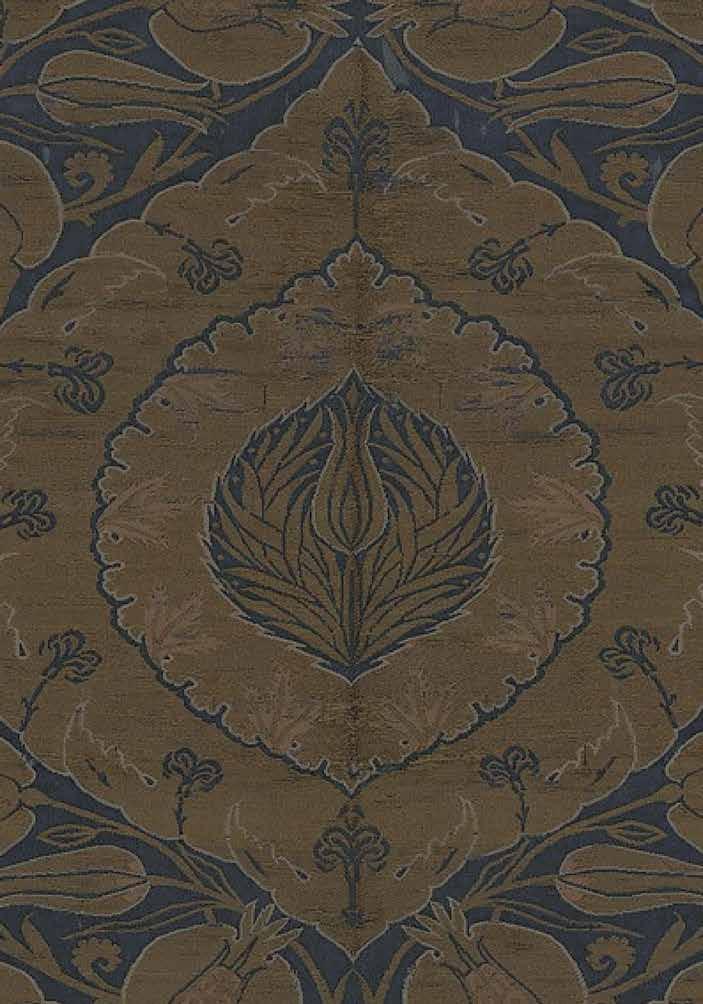Edifying New Generations of Believers
 President’s r e P ort 2022
President’s r e P ort 2022

 President’s r e P ort 2022
President’s r e P ort 2022
“The greatest, truest, and only permanent good bestowed upon humanity is that of true knowledge. From such knowledge, all other goods flow, even faith. And this is why, at Zaytuna College, we have adorned our seal with the prayer Qul Rabbi zidnī ‘ilman (‘Say: O Lord, increase me in knowledge’) (20:114). For it is our knowledge of the world alone that enables us to discern a creator; hence true knowledge will always lead to true faith. The greatest Qur’anic commandment is ‘Know that there is no god but the One True God.’ It is knowledge alone—and most importantly, knowledge of God— that differentiates us from beasts, making us unique among God’s glorious creation.”
President Hamza YusufIn the n ame of God, the Benef I cent, the m erc I ful

Letter from the President iii What Others See in Zaytuna v Academics vii
2022 Commencement 1 Summer Arabic Intensive 3 Fall Student Orientation 5 New Faculty 6 Academic Lectures 8 Enrichment Seminars 11 Faculty Activities 14 Admissions 18 Alumni Spotlight 19
Public Engagement 21 Special Event 23 1200 Strong Community 24 Ramadan at Zaytuna 26 Presidential Highlights 29 Rabi al-Awwal 2022 33 Renovatio 35 The Bookstore 37 Emir-Stein Center 40
College Operations 43
The Zaytuna Campus 44 Donor Wall 48 New Staff 49 The Zaytuna Endowment Fund 50 Financial Review 54 College Leadership and Faculty 56
d ear f riends of z a Y tuna, Salam alaykum. As we finally emerge from a two-year hiatus that seemed to stop time and put our world on pause, we thank our Lord for the blessings of a res toration of the patterns of life that enable us to practice our faith, seek our live lihoods, and visit our loved ones. At Zaytuna College, we were heartened to see classroom education return and the campus pulsing with life once again.
I am grateful to you, our supporters, for your humbling generosity and your prayers during this past year and want to share some of the endeavors and accom plishments you have helped us with.
In this President’s Report, you’ll find words and images that illustrate the return of life and the pursuit of knowledge to the College. Knowledge, we believe, is transmitted through the hearts of people, not just through the lines of books, and we feel blessed with the opportunity to nurture this abiding method of learning, of linking teachers, who themselves are linked to a chain of teachers going back, with students who will continue to extend that chain forward to our descendants, God willing.
Our in-person Commencement last May was unusual, if only because of a stirring keynote address—about submitting to God’s decree during intense trib ulation—by my dear brother, the extraordinary Tobias Tubbs, who spent twen ty-eight years in prison for a crime he did not commit. Since his release, he has devoted himself to serving those in need. We felt our students, and others, would benefit from what he had to share about how he viewed his excruciating journey as a blessing and how he let go of anger and self-pity. “An ger feels better. Rage feels better. But try to find contentment in Allah’s decree,” he told the students. It was noble advice for graduates com mencing their life of learning and service.
Even as we shepherd the educational journeys of our students, we remain committed to educating our broader community of brothers and sisters across the world.
In the fall we held several academic events by faculty and guest scholars and offered enrichment seminars based on the work of luminaries from our tradition, such as Syed Muhammad Naquib al-Attas and Maulana Rumi. We also welcomed two new faculty members specializing in the key areas of Arabic and philosophy, while Imam Zaid Shakir, now a professor emeritus for the College, visited for a week of talks and gatherings with our students.
Even as we shepherd the educational journeys of our students, we remain committed to educating our broader community of brothers and sisters across the world. Our state-of-the-art studio, which we plan to use for an array of on
iii president’s report 2022
line courses, was delayed a bit due to supply-chain obstacles, but we hope to have it completed early next year. Renovatio’s latest edition has been well received and features new and returning writers, including Chris Hedges, Dr. Recep Şentürk, and HRH Prince Ghazi bin Muhammad. The Emir-Stein Center released a new video on the House of Wisdom, which earned a fantastic re sponse. The First Command Book Club has brought people from all over the world reading and discussing great books, and it has helped our 12000 Strong monthly donor initiative reach half its goal, with nearly six thousand supporters.
Finally, the College has been incredibly active in upgrading several import ant buildings at the upper campus and also preparing for an ambitious library project that will transform our flagship redbrick building on the lower campus. In addition, we acquired a nine-unit apartment building for staff and continue to acquire property for faculty housing close to campus.
By the grace of God, we have seen each year better than the last, and we hope and pray that 2023 may be our best year yet. We have several important initiatives ahead, including expanding our permaculture garden of fruits and vegetables to feed our students, staff, and faculty, made possible by a generous donation from the Islamic Food and Nutrition Council of America (IFANCA); the production of online courses and events for the global community that highlight important subjects taught at Zaytuna; and the publication of new books for the Zaytuna Curriculum Series.
We’re also exploring institutional collaborations, one to engage Muslim stu dents at Harvard University with students at Zaytuna, and another to partner with Baylor University for a program that exposes students to Christian and Muslim scholastic traditions that reveal the mutual debt each owes to the other.
As we enter the new year, we’re grateful for your continued support. We hope this President’s Report will strengthen your commitment to what we believe is the most important area of concern in our global community: real education for meaningful lives.
Yours in faith and fraternity,
Hamza Yusuf President, z a Y tuna College
iv president’s report 2022
“Despite numerous challenges, religion continues to play an indispensable role in American society, and in the flourishing of the American people. Zaytuna College ensures that Islam is a key part of that process. Its scholars, students, and wide array of program ming cultivate a uniquely American Islam that speaks to the issues and concerns of the broader populace. Because of this critical and ongoing contribution, Zaytuna College itself has become indispensable.”
Religious liberty lawyer
“When Americans think of distinguished religiously-affiliated colleges, certain names spring to mind: Notre Dame, Yeshiva, Baylor, Brigham Young, Wheaton. These are institutions whose devotion to learning and the pursuit of intellectual excellence is shaped, sharpened, and supported by their theological commitments. We now have an addition to the list: Zaytuna College. Like its peers, Zaytuna is guided by the conviction that faith and reason are, in the words of Pope John Paul II, ‘the two wings upon which the human spirit ascends to contemplation of truth.’ ”
d r. r obert P. g eorge Princeton University
v president’s report 2022
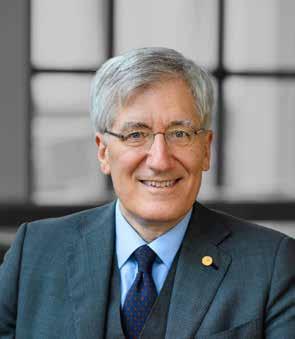
“In the Western world, we suffer both from a kind of cultural amnesia and an inability to engage in serious, civil discourse. With an education that is deeply rooted in the intellec tual heritage of Islam, Zaytuna gives students a sense of the rich resources available to them in their own tradition. Students also engage an array of Western disciplines and points of view. They are thus encouraged to learn to translate between traditions and to bridge cul tural, philosophical, and theological differenc es. Fulfilling its mission to cultivate in students a ‘love of beauty, truth, and goodness,’ Zaytuna offers an education that is both intrinsically desirable and most useful for society.”
d r. tH omas Hibbs Baylor University

“Zaytuna is a genuine school of liberal education. I’m told it means ‘olive’ in Arabic, like the tree that is the symbol on the College seal. Its fruit seems to me an especially telling sign for a school. Olives are hard and bitter, but when marinated in salty brine, in the sweat and tears of hard study, they become a savory food. Not only is Zaytuna a true college of liberal education, but it is also faith-based. Though its intellect is gathered from all the world, its soul is Islamic.”
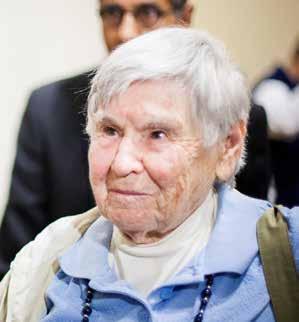
d r. e va b rann
St. John’s College
vi president’s report 2022
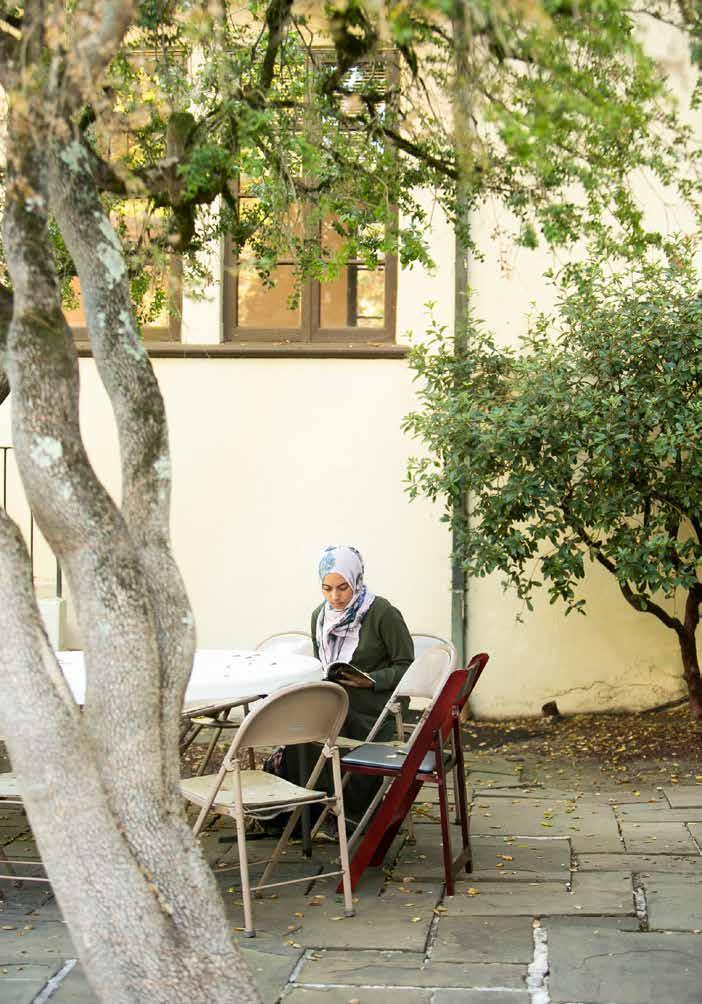


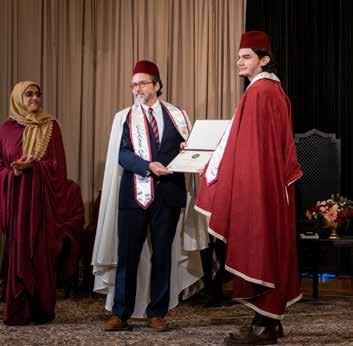
AY ear ago , Zaytuna College embarked on a revival, a Zaytuna 2.0 that would build on the foundational experienc es of the past twelve years to make the College a permanent part of the landscape of higher education in America. This year’s com mencement, the first in-person ceremony since 2019, felt like a physical marker of this new beginning at Zaytuna.
The BA and MA classes of 2022, which had lost more than a year of their campus education to online classes during the pandemic, came together to be honored, while the graduating classes of the previous two years were recognized at the start of the ceremony when President Hamza Yusuf asked graduates present from those classes to rise.
President Yusuf opened the proceedings with a bit of levity about the liberal arts being mocked as a non-utilitarian education: “Someone said to me, ‘Do what you love, and you’ll never have to work a day in your life,’ so I got a liberal arts degree.” The audience laughed. “The reality is that the liberal arts actually built this country,” he said, pointing out that while liberal arts degrees comprise only 3 percent of degrees in the United States, they represent 20 percent of the most influential people in the nation.
He lamented the loss of the liberal arts in the Muslim world: “The abandonment of the liberal arts in the Muslim community is arguably one of the major reasons for the decline of Muslim civilization.”
He said that his late teacher, Shaykh Murabit al-Hajj, may God be pleased with him, wrote two major works on grammar. The great sage likely chose that subject, he realized later, because to revive any civiliza tion or tradition, you must begin at the beginning, which is grammar. “Those who possess grammar, logic, and rhetoric—they have advan tage over other people, for good and ill,” President Yusuf said. “The good use of these arts is to fight for truth and justice and to redress wrongs—in the courts and from the pulpits and podiums.”
His talk reflected Zaytuna’s mission as an institution, reminding the gathered students of the important legacy they carry as they venture into the world. To mark this momentous occasion, he translated his teacher’s poem “O Soul of Mine,” a stirring reminder of eternal Truth and our ultimate purpose, which a pair of students recited in Arabic and English at the commencement.
President Yusuf then introduced the commencement speaker, Tobias Tubbs, as an incredible individual who has devoted his life to uplifting the disenfranchised. Mr. Tubbs served nearly three decades in some of California’s most notorious prisons for a crime that he did not commit, yet he responded to this tribulation with patience and gratitude.
“I looked at incarceration as a journey. It would not make sense any other way,” Mr. Tubbs told the rapt audience. “The first thing I of fer you, from inside of my journey—facing every form of evil, every form of hardship, every form of pain that can be thrown upon a human being—is to treat it as a blessing.” Our entitlement, he said, produces negative and self-defeating responses to trials: “Anger feels better. Rage feels better. But try to find contentment in Allah’s decree, to find con tentment that the building, the prison, was made out of what Allah has created.”
“The first thing I offer you, from inside of my journey—facing every form of evil, every form of hardship, every form of pain that can be thrown upon a human being—is to treat it as a blessing.”
tobias tubbsTwo student speakers representing their graduating cohort, Kashaf Zaman (BA) and Marwan Tayyan (MA), reflected on their days at Zaytuna and all the guidance and learning they received. “We are grate ful to our teachers who persevere with patience to tend to cohort after cohort of seeds who think they are flowers,” said Zaman, likening the student experience to the cultivation of a regenerative garden. “Many thanks to Zaytuna’s entire staff, who keep this garden flourishing and the seeds organized and to all those members of the community who support the College with their prayers.”
After the conferral of degrees, Imam Zaid Shakir, professor emer itus, closed the program with a supplication for the graduates—past, present, and future—and the well-being of the greater community. Thus, the program closed with God’s great reminder to His creation: reflect on His signs and find your way Home. Ð
2 president’s report 2022

s ummer a rabi C i ntensive

f or most of Zaytuna’s incoming BA students, the Summer Arabic Intensive (SAI) serves as the semester before their first semester, while rising sophomores use it to solidify and develop their Arabic skills. The focused-learning community, a bedrock of the Zaytuna educational experience, returned to campus after the pandemic abated, and students once again bonded over a unity of purpose.
A new feature this year, a collaboration with the Deen Arts Founda tion, offered instruction in calligraphy under the direction of two dis tinguished teachers. Dr. Bilal Badat, of the University of Tübingen, studied calligraphy in Istanbul for many years under master calligrapher Efdaluddin Kılıç Hoca, gaining ijāzah (license) in the thuluth and naskh scripts. Farzana Razzaque Hoca has been studying calligraphy and tehzip (illumination) for over five years, gaining ijāzah in the thuluth and naskh scripts from Haji Noor Deen Hoca and Ahmet
.
Ustadha Amina Moujtahid, who has taught Arabic and French for over twenty years, joined the program as a new instructor teach ing beginning Arabic. Her deep foundation in Arabic education in cludes establishing the Arabic language program at Seattle University and writing a book about how the study of Arabic grammar led to the development of algebra.
“As we dedicated eight full weeks to a craft, to an art, to a discipline, to a science, to any praiseworthy endeavor, we were hoping that we were inshallah learning a little bit more about ourselves along the way.” u stad H Yusuf m ulli C k
Ustadh Yusuf Mullick, director of the eight-week program, taught intermediate Arabic to rising sophomores and juniors. In his remarks during the certificate ceremony, Ustadh Yusuf reflected on how the study of grammar can help one find vanity or arrogance in one’s self— but also greatness.
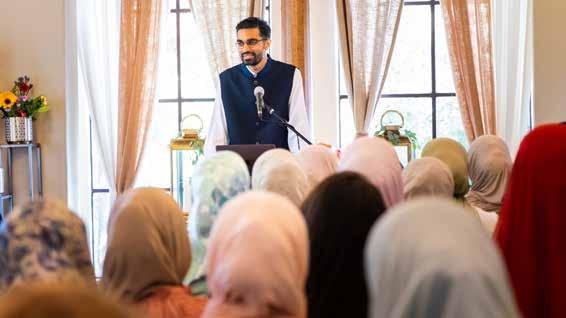
“As we dedicated eight full weeks to a craft, to an art, to a discipline, to a science, to any praiseworthy endeavor,” he said, “we were hoping that we were inshallah learning a little bit more about ourselves along the way.”
The SAI continues to develop as a rich educational experience that provides students with a strong foundation for their lifelong learning, especially those planning to seek admission into Zaytuna’s MA program in Islamic Texts. Ð
l ike so mu CH at Zaytuna, the annual Fall Student Orientation for the incoming cohorts of the BA and MA programs was a communal experi ence, with faculty, staff, and returning students joining newcomers for meals, worship, and advice. Provost Omar Qureshi welcomed the stu dents with a talk that provided a succinct overview of the importance and lifelong benefits of a grounding education in the liberal arts, and he dispelled negative notions about its vocational utility.
Imam Dawood Yasin, director of student life, guided students through the proper intentions of the learner—one of the characteristic qualities of a traditional Muslim education. Shaykh Talal Ahdab, a core faculty member for the MA program, presented the adab of learn ing, and Shaykh Faraz Khan, who teaches classes in the Islamic scienc es across the BA program, emphasized the importance of a daily wird and spiritual balance.
Zaytuna aims to equip students with not only knowledge but also the tools of learning that must precede it. By the grace of God, the orien tation program gives students an understanding of why they learn and gives meaning to this oft-used phrase at the College: “Higher Education for a Higher Purpose.” Ð

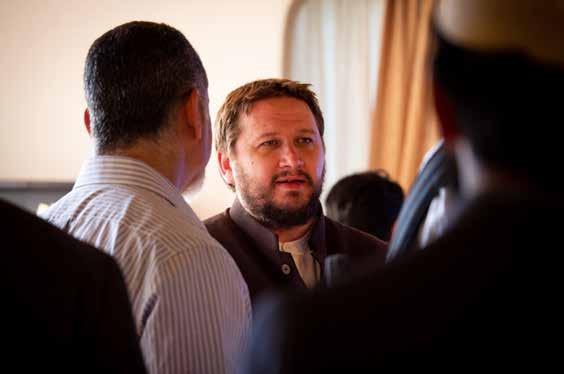
r efle C ting z a Y tuna College’s blend of educational focus on both the Islamic and the Euro-American traditions, our faculty’s rich background includes study at and degrees from Western universities and myriad scholarly licenses (ijāzah) to teach Islamic sciences. This year, the College welcomed two new faculty members: Dr. Rabia Bajwa and Dr. Hasan Spiker
Dr. Bajwa, who brings an extensive background in teaching Arabic to non-native speakers, joined the Arabic department and teaches core Arabic classes to underclassmen. Ustadha Nawal Laymoun, a muchbeloved teacher, departed Zaytuna after spring 2022. Dr. Bajwa has taught at many institutions, including the Georgetown School of Foreign Services, Institute of Ismaili Studies, School of Oriental and African Studies, Oxford Centre for Islamic Studies, and Bayan Claremont. “At Zaytuna, you’re not only exposed to Arabic in Arabic language classes,” she observes, citing the primary-text-study aspect of the Zaytuna curriculum. “Arabic is interspersed in all the subjects. The students’ Arabic is richer.” Dr. Bajwa knows that students will be immersed in classical literature, so she focuses on listening and speaking.
She aims to train students so they can access those texts as well as navi gate the modern Arabic landscape.
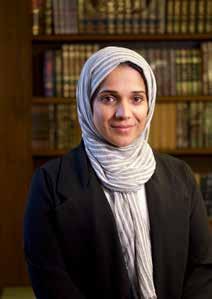
Dr. Spiker’s main area of study is the intersection of the kalam tradi tion, Avicennian philosophy, and metaphysics. His background includes traditional studies in the Islamic sciences and the study of philosophy and theology, all of which culminated in a doctorate focusing on Ploti nus and the Categories. Slated to teach courses across the theology and philosophy concentration in the undergraduate and graduate programs, he spent his first semester teaching Logic in the Islamic Tradition for the BA program and Philosophy 1 for the MA program. He explains that an approach that synthesizes knowledge is uniquely able to answer mod ern challenges to our beliefs. “In our conversation with modernity,” he says, “we must be able to speak to the whole person, and that integrated approach allows us to do so. This was a very widespread and acknowl edged option among the ulama of the Ottoman and Mughal worlds. It’s not an imposter or a modern creation.”
Zaytuna aims to produce learners who are both grounded in tradition and able to address the contemporary world, and each faculty member brings something new and valuable to this objective. Dr. Bajwa’s work bridges tradition and the contemporary Arabic-speaking world, while Dr. Spiker’s research builds on a living yet overlooked Muslim intel lectual tradition that can effectively engage modernity. The College is grateful to have them both. Ð
“At Zaytuna, you’re not only exposed to Arabic in Arabic language classes—Arabic is interspersed in all the subjects. The students’ Arabic is richer.”
d r. r abia b ajwa
president’s report 2022
tH e intelle C tual C ulture at Zaytuna College is enriched regu larly by scholars—faculty members and visiting professors—who give focused talks, followed by question-and-answer sessions, on major books or topics that enhance our understanding of a subject: its context as well as its relevance in modern life.
Chief among these initiatives is the Canon Lecture Series, introduced by Provost Omar Qureshi in 2019, in which faculty members and other scholars introduce and explicate foundational texts and commen taries from the Islamic and European traditions and provide accounts justifying their place in the College curriculum.
Dr. Mark Delp, professor emeritus at Zaytuna, presented Aristotle’s De Anima (On the soul) in spring 2022. “Most people today would as sume that a book on the soul would have to do with religion,” Dr. Delp noted. Aristotle’s book addresses religion only because the human soul has the power to conceive “ideas that are immaterial, that lack matter. In order to account for these, Aristotle seems compelled to acknowl
president’s report 2022
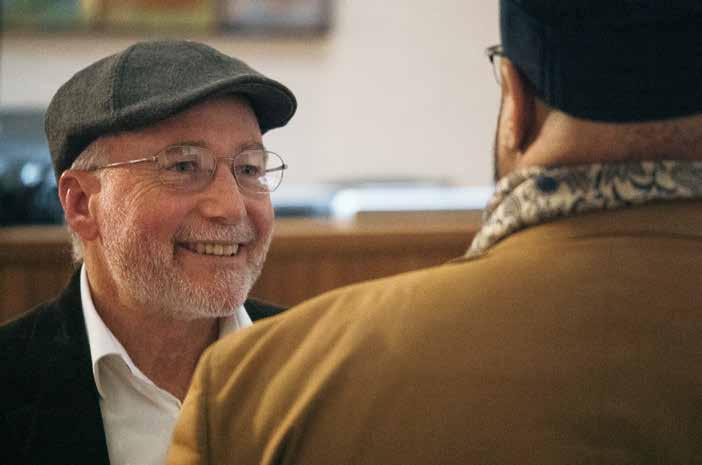
edge a quasi-divine part of our nature. But for the rest, the book situates the soul solidly in the natural world.” Such an investigation was met with considerable interest by later generations of Muslim and Christian scholars, for whom the nature of the immortal soul was profoundly important. Muslim commentaries on De Anima exercised a strong influ ence on the Latin scholastics as they penned their own commentaries. The broader commentary tradition, including those on other works, is the key to understanding classical Muslim and Christian thought and the distinctive yet parallel liberal arts education that each produced.
Two additional lectures from the Canon Series occurred in the fall semester. Dr. Hatem Bazian’s lecture in October focused on Adam Smith’s classic work on economics, The Wealth of Nations. In his talk, Dr. Bazian focused on how he believes Smith’s thought relates to con temporary problems, especially in colonial and postcolonial political economies. In November, Dr. Ali Ataie presented a Canon Lecture on Kitāb al-itqān fī ¢ulūm al-Qur’ān (The perfect guide to the sciences of the Qur’an), the magnum opus of Imam Jalal al-Dīn al-Suyūţī (d. 911/1505). Imam al-Suyūţī’s work is considered the most authoritative and comprehensive and, thus, greatest text on the Qur’anic sciences. It is a masterful distillation of dozens of books written by various tra ditional scholars of the following disciplines: Qur’anic exegesis, vari
9 president’s report 2022
 Dr. Hatem Bazian
Dr. Hatem Bazian
ant readings, Arabic language and vocalization, Qur’anic ordinances, Qur’anic insuperability, and many others.
Zaytuna’s students also benefited from additional lectures by visiting scholars in the past year. During a visit to Zaytuna in March, Dr. Issam Eido, a professor of religious studies at Vanderbilt University, spoke on the formation of hadith as a science in early Islam. The talk, which featured close readings of primary texts in Arabic, gave students and visitors alike a glimpse of the hadith tradition’s richness.
In May, Dr. Fareeha Khan, a researcher and historian of Islamic intellectual history, delivered a lecture on the great twentieth-century scholar Mawlana Ashraf Ali Thanvi and his creative response to the needs of Muslims during a time of crisis in contemporary colonized India, when he famously engaged Maliki legal thought to formulate a fatwa making it easier for Hanafi women to annul their marriages. Dr. Khan explained how her current understanding of Mawlana Thanvi il lustrates her own intellectual growth: as a student she had believed he was acting purely out of a practical concern for women’s rights, while her mentor Dr. Barbara Metcalf, who was in the audience at Zaytu na, had believed Mawlana Thanvi acted to maintain the authority of India’s ulama. But now, Dr. Khan said, she has arrived at a more nuanced position that highlights the great scholar’s spiritual motivations— meaning neither she nor her mentor had been entirely correct. Ð
10 president’s report 2022
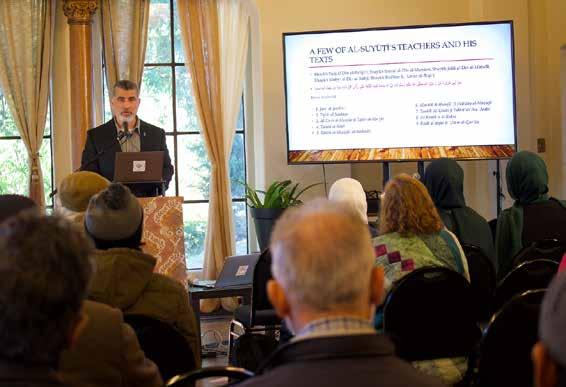 Dr. Ali Ataie delivering his Canon Lecture
Dr. Ali Ataie delivering his Canon Lecture
President hamza Yusuf began a seminar series for students on Syed Muhammad Naquib al-Attas’s Islam and Secularism. The book, whose author is one of Islam’s greatest living philosophers, is steeped in deep training in the Muslim tradition and knowledge of Western thought. President Yusuf has made the series a springboard for students to apply, through their questions and discussion, the knowledge they have developed through their courses. Each session in the seminar guides students through a chapter of the great work.
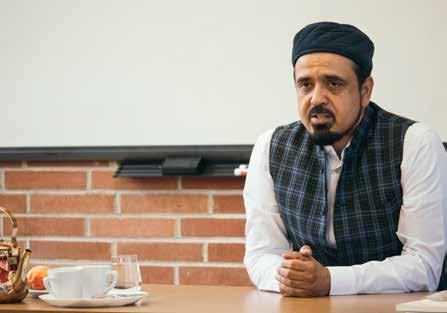
Ustadh Feraidoon Mojadedi, an expert on Persian poetry who also serves as the College’s events and volunteer manager, began a series called From Rumi to Iqbal: An Introduction to Persian Poetry, which provides an overview of the Persian verse tradition, perhaps the most important, yet neglected, literary tradition in Islam. In his sessions, Ustadh Feraidoon not only provides broad context but also takes par ticipants through close readings from great works of poetry, such as “The Lament of the Reed,” a parable in Maulana Rumi’s Masnavi, and “The Light of the Self” by Allama Muhammad Iqbal, the great twenti eth-century Indian poet-philosopher who presented his ideas through poetry in Persian, Urdu, and Punjabi.
Both of these series offer a window into a different great Muslim civilization. Syed Naquib is the product of the Nusantaran civilization of the Malay world, which was linked through the Indian Ocean with South India, Yemen, and the Horn of Africa. The Persian literary tradi tion, on the other hand, is the dominant strand in the Islam of Central and South Asia, as it was the scholarly language of those regions. Ð
11 president’s report 2022
Ustadh Feraidoon Mojadediour prayer that if that seed of knowledge is planted firmly and deeply in the ground of this land, one hundred years from now, when everyone in this room will be dead, Zaytuna College will endure, God willing, and you’re all part of that.”

“It’s
Professor emeritus Imam Zaid Shakir, long beloved by all cohorts of students at Zaytuna College, returned in the fall and gave a series of talks on varied topics, spent time with students in informal conversations, and delivered a Friday sermon as well.
Imam Zaid spoke to undergraduate students about the Muslim con cept of justice and to graduate students about what Islam can contribute to the discussion of human rights (a topic he wrote about in the newest issue of Renovatio).
To a College-wide audience, he presented “The Historical Signifi cance of Zaytuna College,” describing the inception of Zaytuna Insti tute in Hayward, California, twenty-five years ago and its journey into the present. He reminded those in attendance—including students too young to have witnessed the beginning of the College—that they, too, could well represent only the beginning of Zaytuna’s story. “It’s our prayer,” he said, “that if that seed of knowledge is planted firmly and deeply in the ground of this land, one hundred years from now, when everyone in this room will be dead, Zaytuna College will endure, God willing, and you’re all part of that.”
Imam Zaid also highlighted the pioneering educational work of John Erskine, the founder of the General Honors course at Columbia Univer sity, in the early twentieth century, which later inspired the Great Books movement. That movement fell out of favor for various reasons, from popularity of radical postmodern approaches after the late 1960s to the secularization of the study of the texts themselves, and is only now see ing a resurgence, especially (and notably) in Christian homeschooling communities.
Imam Zaid identified what makes Zaytuna’s role in the revival of the Great Books distinctive: the study of these works is intertwined with a strong grounding in the trivium, the tools of learning, as emphasized in not only the European but also the Muslim tradition. Had this sort of rigor been an integral part of the Great Books approach in the past, Imam Zaid contended, “perhaps the vigor necessary to stand in the face of the forces I mentioned could have sustained the movement.” Imam Zaid’s talk, filled with references to many people whose tireless work and prayer have been essential to Zaytuna’s success over the years, in stilled the gathered staff and students with a sense of duty to future generations, of the farđ kifāyah (communal responsibility) to establish a sustainable institution of Muslim learning in the service of the commu nity yet unborn. Ð
13 president’s report 2022
z a Y tuna College fa C ult Y members have kept busy, not just teach ing their classes but also furthering their intellectual pursuits through participating in public forums (podcasts and community events), attending academic conferences and workshops, and publishing articles in scholarly publications.
Provost Omar Qureshi attended the first of three new summer work shops at Villanova University in Pennsylvania designed to help coun teract the trend of universities serving as mere credentialing agencies for future employment rather than fulfilling their traditional role as places to cultivate the spirit of meaningful inquiry. The “Hope in Higher Education” workshop, an initiative co-led by Dr. Anna Moreland, associate professor of theology at Villanova, brought together a group of scholars from around the country to create a national coalition of like-minded educational institutions to strengthen the whole field of higher education.
“Higher education should inspire undergraduates to think deep ly about the universe and their place in it,” Dr. Moreland says. “We look forward to creating a vibrant coalition among the leaders of these new initiatives for the next several decades and to driving institutional change in higher education.”
Provost Qureshi and President Hamza Yusuf contributed articles to a new volume titled Islam and Biomedicine, edited by Dr. Afifi alAkiti of the Oxford Centre for Islamic Studies and Dr. Aasim I.
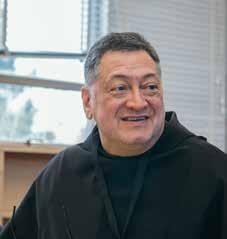
14 president’s report 2022
 Dr. Ali Ataie
Fr. Francisco Nahoe
Dr. Ali Ataie
Fr. Francisco Nahoe
Padela of the Medical College of Wisconsin. The volume compiles contemporary Islamic thought on philosophical and ethical issues re lated to medicine. President Yusuf published a version of his essay on abortion that was first printed in Renovatio as “When Does a Human Fetus Become Human?” Provost Qureshi contributed a chapter titled “Islam and Science: Reorienting the Discourse” with two coauthors. “We believe that conflicts between ‘Islam’ and ‘science’ do not occur at the level of empirical observation,” the authors write, “but that they emerge from the differing epistemological and ontological commit ments found in the various scientific approaches and those of the several Islamic theological schools.”
Dr. Abdullah bin Hamid Ali, who teaches courses related to Islamic law at Zaytuna, helped spearhead a joint project between the College and the Acton Institute for the Study of Religion and Liberty that aims to produce three to six original articles on the Islamic conception of forming a just and moral society. The articles will form a symposium feature in the Journal of Markets & Morality, a peer-reviewed academic journal published by the Acton Institute.
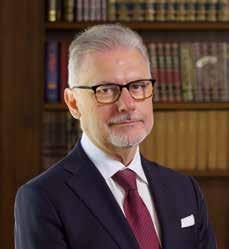
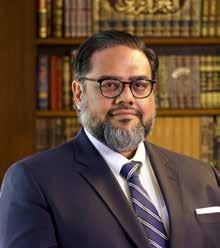
Both Dr. Abdullah and Dr. Ali Ataie, a Zaytuna faculty member who specializes in biblical hermeneutics and comparative theology, appeared on more than one occasion on the popular Blogging Theology podcast hosted by Paul Williams, which posts the video versions on YouTube. Dr. Abdullah had two major engagements on the podcast, a debate with journalist Mustafa Akyol on why Muslim civilization fell behind the West and an interview on the potential for Islamic law to change in new circumstances. Dr. Ataie took part in two detailed sessions with Williams—“Is the Qur’an Preserved?” and “The Son of Man: Who Was He?”—each of which received more than fifty thousand views.
15 president’s report 2022
Shaykh Talal Ahdab Dr. Jawad QureshiDr. Jawad Qureshi, of Zaytuna’s MA faculty, traveled to Amsterdam in the summer to the Vrije Universiteit Amsterdam to participate in a conference titled “Genealogies of Salafism and Scholars of Damas cus,” where he presented his paper “Nasir al-Dīn al-Albani and the Recovery of Authenticated Islam: The Challenge of Purist Salafism.”
He also served on the programming committee and as a respondent in the annual conference of the North American Association of Islamic and Muslim Studies, titled “Lives of Hadith.”
Fr. Francisco Nahoe, who teaches courses across the trivium as well as ethics, politics, and principles of democracy, visited Dublin, Ireland, in the spring to present his paper “Dionysian Imitatio and Milton’s Italian Style” at the annual meeting of the Renaissance Society of America. Fr. Francisco is well suited to discuss the works of the seventeenth-century English poet John Milton, as his doctoral dissertation was on “The Ital ian Verse of Milton,” a lesser studied as pect of the great poet’s legacy of letters.
Dr. Phillbert (Phill) Cheng, who teaches logic and philosophy, successful ly completed the oral defense of his dis sertation, a project he had been working on for the past two years while teaching at Zaytuna. The dissertation focuses on the nature of unity and its various ex pressions in Platonic metaphysics, a topic he chose because he began to realize that “Likeness and Unlikeness were cru cial to understanding creaturely unity.” Professor emeritus Mark Delp served as an outside reader and provided irre placeable guidance to Dr. Phill.

Dr. Uzma Husaini successfully completed her doctoral studies at UC Berke ley and the Graduate Theological Union, earning her PhD in Qur’anic studies. Her dissertation contributes to filling a gap in the field of Qur’anic studies by introduc ing the study of the science of tajwīd to the broader question of the authenticity of the Qur’an.
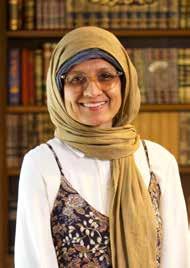
Shaykh Talal Ahdab, who teach es courses on kalam theology, Islamic
16 president’s report 2022
Dr. Phillbert (Phill) Cheng Dr. Uzma Husainijurisprudence, and legal theory, taught a concentrated online class in troducing kalam metaphysics tailored for scholars and professors of Islamic studies and theology; postdoctoral scholars, researchers, and graduate students; and madrasah graduates and students of knowledge. The American Society of Islamic Philosophy and Theology offered the course as part of their Symposia on Mature Islamic Theology. Shaykh Talal used Imam Sa¢d al-DĪn al-Taftāzānī’s Tahdhīb al-kalām as the core text, covering chapters on existence and nonexistence; quiddity; neces sity, contingency, and impossibility; unity and multiplicity; and cause and effect. More than four hundred students from five continents participated in the class.
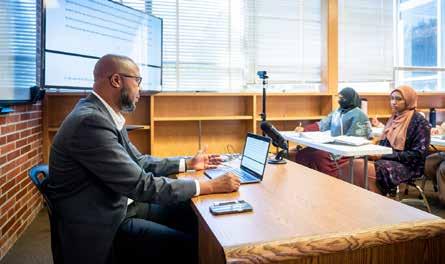
Dr. Hasan Spiker, Zaytuna’s newest faculty member, a specialist in metaphysics, was a featured speaker at the publication launch in Oxford of the Tabah Foundation’s Classification of Islamic Sciences project, which aims to reaffirm the foundations of Islamic metaphysics and epistemology “in light of the challenges posed by the dominant philosophies of modernity.” The launch heralded the release of two major books for the project, Dr. Spiker’s Things as They Are: Nafs alAmr and The Metaphysical Foundations of Objective Truth and Dr. Karim Lahham’s The Anatomy of Knowledge and the Ontological Necessity of First Principles. The third book in the series, The Reality of Definitions by Dr. Mustafa Styer, is forthcoming. The American Muslim theologian Dr. Umar Faruq Abd-Allah of Chicago introduced the project and strongly encouraged those who could access the books to study them deeply. “To master this kind of knowledge is an obligation binding on the ummah,” said Dr. Umar. “These works are, I believe, milestones, and I think they will stand out in the intellectual history of this point, not just for us, but for everyone.” Ð
17 president’s report 2022
Dr. Abdullah bin Hamid Alia s z a Y tuna C ollege continues to attract the most qualified students for its rigorous courses of study in a bucolic environment, those con sidering enrollment in the BA or MA program for fall 2023 would do well to visit the campus, meet current students, walk through the class rooms, and ask questions of the admissions staff and faculty to assess whether the College is the right fit for them.
In October, more than forty visitors attended an open house event on campus. Prospective students, their families, and some community mem bers traveled to Berkeley for the occasion, including a family that drove all the way from Nevada. They met with teachers, current students, and members of the admissions team who welcomed them and organized their packed day at the College.
Ustadh Yusuf Mullick, a lecturer in Arabic and director of the Summer Arabic Intensive, presented a framework of the Zaytuna curric ulum, which is unique in situating the liberal arts within both the Muslim tradition and the Euro-American tradition.
Several student guides took an active role, allowing prospective stu dents to ask questions and become acquainted with people on the path that they are considering. The students took their guests around campus in sever al small groups, ensuring that every visitor benefit ed from individual atten tion as he or she explored the College. During one tour, they came across students leaving for an as tronomy field trip, giving an illustration of the type of learning that is part of the Zaytuna experience.
A community lunch provided an opportunity for conversation and reflec tion on a potential future at the College.
Earlier, in August, Zaytuna welcomed fifteen incoming BA students and six MA students. The admissions team hopes to receive ninety to one hundred applicants during the next cycle, and they have already noticed an uptick in domestic applications as the reputation of Zaytuna’s educa tional program grows. Ð
18 president’s report 2022
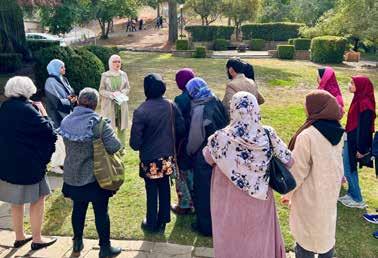
s tudents in t H e nine graduating classes of Zaytuna’s BA program have pursued a variety of careers and professions, as well as further stud ies at prestigious colleges and universities. It is a testament to the liberal arts degree with an Islamic studies focus that graduates have thrived in their chosen pursuits. Mohammad Ahmad Khan, a 2016 graduate, has spent the last six years serving the Muslim community in Houston, first as an imam and now as an active community educator.
Before arriving at Zaytuna, he was studying biology and had a back ground in Muslim learning, having spent some time in Pakistan in his teens to study ĥifż al-Qur’ān, tajwīd, and qirā’ah at Darul Uloom Faisalabad, but he recognized that he needed to learn more. He attended a Zaytuna College event and, he says, “Zaytuna sparked something in me. I came home and told my parents ‘This is something I’ve got to do.’ I felt like your baseline colleges and universities didn’t focus enough on learn ing. They are more about busywork.”

As an imam and educator, he finds that the knowledge he acquired at Zaytuna—especially the emphasis on theology, which helps to contrast right and wrong belief—has allowed him to navigate thorny intellectual and cultural challenges and questions. He also credits the ethics, philos ophy, and logic components of the curriculum with giving him valuable tools in his pastoral role: “You pull out different ones depending on what is necessary.”
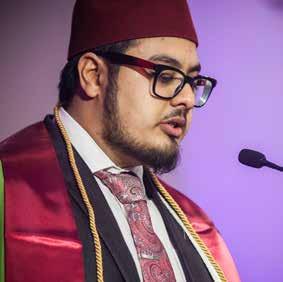
During his studies at Zaytuna, Imam Ahmad frequently spent extra time with his teachers, including Shaykh Abdullah bin Hamid Ali, Imam Zaid Shakir, and Shaykh Faraz Khan. These student-teacher relationships provided him with a model for guiding people with an eye on their well-being. Soon after graduating, he took the position as an imam, which quickly grew into the role of senior religious director at the Maryam Islamic Center in Houston. “Part of the reason that hap pened,” he explains, “was that I was doing a lot of innovative work like developing workflows, marketing, and so on. I would attribute that directly to Zaytuna College. I was trying to mirror what I observed.”
Imam Ahmad recalls his student years as intense—at times he and his classmates had to debate whether they had time for basic errands; yet this striving opened a door. “When you put the effort in, you can really change your life’s outcome,” he says. In his work since graduation, Imam Ahmad has held this lesson close to heart.
“I needed Zaytuna,” says Sidra Qazi. “It was like the bridge. I was com ing to a new place, but it was Islamic.” Now a Bay Area resident, Sidra spent her formative years in Syria, where her whole family had moved to study Arabic. She learned it fluently and went on to study at the shariah high school, but with the outbreak of the war, her family returned to the United States. “I had never traveled anywhere,” she says. “I grew up in Syria, so for me, it wasn’t just the education. It was the cultural change, the cultural shock, everything. That’s where Zaytuna came in.”
At Zaytuna, she was able to situate herself in the West while remain ing deeply rooted in the Arabic language and what she had learned in Syria. The sense of community helped, too. She found that her class mates loved having a student with her background and sought her help in Arabic and tajwīd.
“I focused first on English writing, grammar, and logic,” she notes, as studying in English was new to her. “I was able to see it’s not one or the other; it’s both. It’s our traditional education in all the sciences and the trivium.” By the end of her degree work, her English had become a strength. Ð
20 president’s report 2022
“When you put the effort in, you can really change your life’s outcome.”
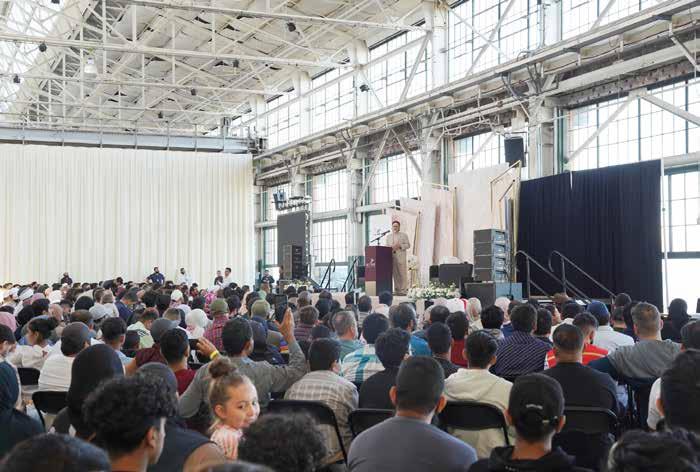
Previous page: President Hamza Yusuf speaks in Richmond, California, at an event with Khabib Nurmagomedov (see page 32)

z a Y tuna College was honored to host author Michael Sugich for a conversation with President Hamza Yusuf about the American launch of Exemplars of Our Time, a multibook set produced by Sugich and the acclaimed photographer Peter Sanders that explores the lives of eight great twentieth-century Muslim sages.
“They are always there, these people, and they’re often hidden,” said President Yusuf in his opening address, speaking from his own experience of study and companionship with the Mauritanian scholar-sage Murabit al-Hajj, whose biography he contributed to the set. “They’re not always scholars,” President Yusuf continued. “If they are scholars, and many of them have been, they’re certainly not a pedantic type of scholar, people whose scholarship leads to arrogance or a sense of supe riority.”
Framing the project, Sugich noted that these spiritual masters were born not in a mythologized or distant past but in the more recent world in which Muslim societies were subdued and subjugated by European powers, living through colonialism, world wars, revolutions, imprison ment, and exile. “They witnessed the desacralization of their societies and deterioration of traditional values,” Sugich said. “Yet, in spite of all that, each has left a lasting legacy of wisdom and teaching that continues to inspire generations of believers seeking a sane, balanced, and compas sionate way to live in a challenging world.”
The September event, organized in conjunction with Mecca Books, marked Zaytuna’s first in-person public event since commencement in May. The live audience that gathered in the sanctuary of Zaytuna’s redbrick building had the opportunity to witness the reflections of two men who had profound personal experiences with some of the sages profiled. Ð
“They witnessed the desacralization of their societies and deterioration of traditional values. Yet, in spite of all that, each has left a lasting legacy of wisdom and teaching that continues to inspire generations of believers seeking a sane, balanced, and compassionate way to live in a challenging world.”
23 president’s report 2022
a g lobal Communit Y of l earning

Members of the Muslim community who pray for the success of Zaytuna College, and those who make recurring financial gifts to help support the College to the best of their ability, do so because they believe in the benefits of education and learn ing. This year, the College made a concerted effort to grow its monthly donor pro gram—12000 Strong—and by the grace of God, it has grown dramatically and we’re halfway there as the year ends. What better way for the College to give back to its committed supporters who make monthly financial gifts than to provide them with the gift of knowledge? To that end, in 2022, the College emulated the Proph et’s path of building a community with circles of knowledge: it launched the First Command Book Club, with books curated by President Hamza Yusuf, launched a community newsletter (Read and Rise!), livestreamed learning sessions, and provides access to all recordings for 12000 Strong members.
tH e g reat b ooks canon, much of its tomes written in premod ern times, can feel elusive in our age. What were once widely shared cultural touch points and staples of learning are rarely taught as part of basic higher education. The trouble lies with the preparation required to work through and grasp layers of meaning from the classics. “One of my teachers in Mauritania,” recalls President Hamza Yusuf, “said that the ancients would make a statement whose commentary requires an entire book. But the moderns will write an entire book that can be summed up in a statement.”
If someone wants to pursue the classics today, it can be difficult to know where to start. One option is Zaytuna’s novel online learning initiative, the First Command Book Club, launched in January 2022 to bring these great texts to eager readers, no matter where in the world they reside.
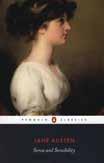
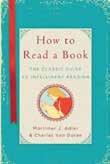
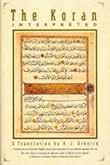
24 president’s report 2022
 12000 s trong Communit Y The First Command Book Club: Read!
12000 s trong Communit Y The First Command Book Club: Read!
A world map showing the varied locations where members of 12000 Strong reside

As Zaytuna College emphasizes in its curriculum, learning how to learn is a prerequisite to learning itself. Thus, the program opened with a classic from the mid-twentieth century, Mortimer Adler and Charles Van Doren’s How to Read a Book. Adler and Van Doren them selves were devoted to cultivating the reading and reasoning skills that are the bedrock of a free society.
Since then, the book club has explored novels (Jane Austen’s Sense and Sensibility and Fyodor Dostoevsky’s The Brothers Karamazov), philoso phy (Aristotle’s Politics), classical Muslim scholarship (Ibn Khaldūn’s Muqaddimah), and many other fields, with each work opening a door to cultural, historical, literary, and theological exposure and enlighten ment.
President Yusuf leads the book club, holding monthly livestreamed sessions to discuss the month’s book, including its context, implications, and references, and to converse with group members from around the world.
Ghazala Zia, a reader from the UK who homeschools her three chil dren, says, “The quality of my parenting and teaching is directly linked to my own growth. The First Command Book Club has had a profound impact on me and inspires me to reflect deeply. The opportunity to journey through such rich works with a teacher whom I have respected for a decade is a great gift from God.”
The book club has developed a significant audience committed to reading and reflection. Aspiring readers can join by participating—at any level they can afford—in Zaytuna’s 12000 Strong monthly donor program. (Visit zaytuna.edu/give/12000-strong.)
25 president’s report 2022
tH e 12000 s trong program introduced other member benefits in 2022, highlighted by a compilation of some of the prayers the Proph et Muhammad s performed for different occasions, beginning with when he awoke from sleep each day. “The Prophet devoted himself to a stunning series of daily mindful supplications for every intentional act he performed,” wrote President Hamza Yusuf in his Foreword to the prayer book. President Yusuf also translated the prayers with Dr. Asad Tarsin. Beautifully designed and printed for ease of use, the book was mailed as a gift for members of the 12000 Strong program.
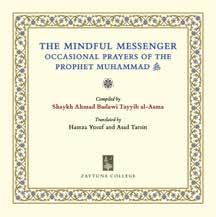
Zaytuna also launched a new digital initiative this year for 12000 Strong supporters: Read and Rise, a community newsletter that aims to keep one eye on the current moment and the other on the rich intellectual tradition that Muslims have developed over fourteen centuries. Read and Rise features interviews, essays, spiritual reflections, and poetry that are edifying and intellectually stimulating. Its contributors include staff, faculty, current students, and alumni. Ð
r amadan at z a Y tuna
r amadan is t H e month in which the Qur’an was revealed, a sanc tuary in which every deed is amplified. “For many of us today, Ramadan is a time for a requisite pause, a reset of our daily routine, and a respite to orient our lives toward the prophetic path,” wrote President Hamza Yusuf in a letter to supporters of the College. “Allah asks us in the Qur’an, ‘So where then are you going,’ and Ramadan, reminding us of the reality of the hereafter and the triviality of our temporal world, clarifies our true destination.”
Imam Zaid Shakir and President Yusuf invited supporters and neighbors to campus for a series of special community iftars, bringing together staff, students, faculty, and honored guests to break their fast and pray together, sharing in the blessings of the sacred month.
A community iftar at Zaytuna
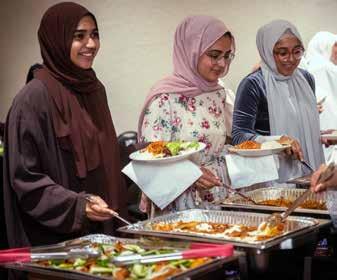
Throughout histo ry, Muslim scholars set aside their other stud ies to focus on the Holy Qur’an. Zaytuna College continues this tradition, with the rippling mur mur of many voices in qirā’ah resonating across the campus. Students and teachers join to start and to break their fasts and fill the lines of prayer during the night, as the campus comes ever-more alive with worship and study.
The College shares this atmosphere of learning and spiritual growth through a variety of programs for the broader audience outside the College, including President Yusuf’s Jewels of the Qur’an series, which uses Imam al-Ghazālī’s seminal work to explore the Qur’an and its meanings.
Members of The First Command Book Club spent the month reading A. J. Arberry’s The Koran Interpreted, a pioneering translation that seeks to reflect not only the wording but also the structure of the Qur’an. The Ramadan sessions were livestreamed and open to the public as well. Their interactive nature allowed participants to discuss the Qur’an with each other and with President Yusuf.
“When the month came to an end,” wrote President Yusuf, “[schol ars and sages of the past] would lament its passing and pray for its quick return the following year.” Ð
e a CH r amadan, t H e Muslim community in the United States grap ples with differences of opinion about how to begin the sacred lunar month. Many, conceding to the fixed schedules of modern life, have accepted a pre-calculated date to start the month, while others adhere to the traditional reliance on a naked-eye sighting of the new moon, which precludes a predetermined first day of Ramadan. If the moon isn’t sighted, Sha¢ban extends another day.
To help clarify the astronomical and legal issues related to determin ing the beginning of lunar months, Zaytuna College released an ani
mated video presentation on moon sighting by Dr. Youssef Ismail, professor of astronomy, mathematics, and jurisprudence at the College. He opens the video with the hadith in which the Prophet s commands, “Do not start the fast until you see the new moon, and do not break the fast until you see the new moon. If the new moon is obscured from you, then complete a full thirty days.” Calculating the first day of the month, he says, not only rejects the instructions of the Prophet s but betrays a misunderstanding of how such calculations work—and of the science itself.
Dr. Ismail details why the moon’s shape changes as he provides in struction, with dynamic graphics that situate viewers in the proper as tronomical context, on how to sight its crescent. He asserts that while astronomers have calculated and recorded many aspects of the moon’s movements, this knowledge cannot substitute for moon sighting be cause it is inherently incomplete.
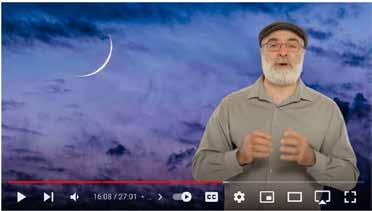
“No computer simulation can account for the variability of the weather in any given location on the earth for any given hour of the day,” he says. “The important thing to note is that the astronomical models are useful tools in helping us predict what the moon might look like in the sky and where it might appear in the sky, but they cannot forecast whether the moon will actually be visible or not.”
Classical Muslim astronomers also understood this. They too had sophisticated models and made astronomical predictions and calcula tions, but they never used these models as a basis for determining the first day of the new month, because of the inherent incalculability of the actual conditions. And so, the real science of the past and present con firms the original practice as established by the Messenger of God s. “This is the crescent moon,” Dr. Ismail says as the image appears onscreen. “Seeking it is a sunnah of our master Muhammad s. Make it your sunnah as well and reap the blessings and benefits that it brings forth.” Ð
28 president’s report 2022

i n m a Y , Canadian intellectual Jordan Peterson released an episode on his popular podcast featuring President Hamza Yusuf on the topic of “What We Can All Learn from Islam and the Quran.” In the con versation, President Yusuf presented Islam in the more familiar context of Western thought and religion—to which Islam is a contributor and inheritor, not merely an interlocutor. Their wide-ranging discussion covered topics including the afflictions of contemporary society, repen tance, President Yusuf’s own journey to Islam, and what differentiates Islam among religions.
“The beauty of Islam is that you get the Old Testament, the New Testament, the Last Testament…. Muslim theology is a radical monotheism that even transcends the monotheism of Judaism.”
President Hamza YusufPresident Yusuf used the opportunity to illustrate key concepts about Islam to Peterson’s large audience—the video of the conversation gar nered two million views on YouTube—likely unfamiliar with the reli gion. For example, he pointed out that during the hajj, the pilgrim is really preparing for death: “You get into white clothes which symbol ize the shroud, and then you stand on the plane of ¢Arafah, like the Day of Judgment, which symbolizes that all of humanity is going to stand—
29 president’s report 2022
in a nonspatial, nontemporal sense—before their Creator and be judged for what they did.”
When Dr. Peterson expressed a desire to know about the core beliefs of Islam, President Yusuf cited the famous Hadith Jibrīl, in which the entire religion is encapsulated: īmān, islām, and iĥsān.
Dr. Peterson followed up with a reflection about his own religious search: “I’m trying to figure out how to be a Jew and a Christian and a Muslim at the same time.”
President Yusuf succinctly replied, “Become Muslim. That’s the best way, because the beauty of Islam is that you get the Old Testament, the New Testament, the Last Testament…. Muslim theology is a radical monotheism that even transcends the monotheism of Judaism.”
At the close of the episode, Dr. Peterson said, “I think it’s very useful to outline the central tenets of Islamic faith… to begin a reconceptual ization in some sense in the intellectual sphere that it might be useful for all the people of the Abrahamic traditions to recognize their similarities moving forward, rather than concentrating on their differences.”
s uqr Ā Ţ : t he m uslim s ocrates. Bard College Berlin, a small, residential liberal arts college located in what was the embassy quar ter of former East Berlin, invited President Yusuf to present Socrates from the Islamic tradition as part of their freshman core course, Plato’s Republic and Its Interlocutors.

In his insightful talk, titled “Suqrāţ: The Muslim Socrates,” President Yusuf discussed the Socratic influence on Arab philosophers and the Muslim intellectual tradition: “Al-Kindī, the father of Arab philosophy, wrote critical remarks on Socrates called Suqrāţ, seeing him as a great sage, a lover of wisdom, and an ascetic, who renounced the world.”
30 president’s report 2022
t exas t our. In February, President Yusuf and Imam Zaid Shakir traveled to Texas to meet several Muslim communities across the state. The trip included a live discussion on “The Prophetic Model of Educa tion,” a topic of critical importance to any Muslim institution. There was an outpouring of support and interest from seekers of knowledge, including many children who shared their aspiration for a Zaytuna ed ucation.
i bn r ushd and the c hristian t radition . In May, Presi dent Yusuf delivered a seminar on Ibn Rushd (Averroes) for the Clas sical Learning Test community as part of their Journey Through the Author Bank series. Ibn Rushd, one of the most important scholars in the Muslim tradition known for his contributions to legal theory and philosophy, became—through translations of his works—one of the most influential figures in medieval European thought. During his pre sentation, President Yusuf quoted the nineteenth-century French Orientalist Ernest Renan to signify the importance of Ibn Rushd to the Christian tradition: “St. Thomas (Aquinas) is the most serious adversary the Averroist doctrine has encountered; but we might state, without sounding paradoxical, that he was also the first disciple of the Great Commentator.”
z a Y tuna h osts i ndonesian d elegation. Under the auspic es of the International Visitor Leadership Program, twenty imams and religious leaders from Indonesia visited Zaytuna College in May. The neighboring Graduate Theological Union hosted the delegation for a private luncheon, with President Yusuf as an invited guest. After lunch, they joined the Zaytuna community for Friday prayer and then enjoyed a private campus tour with President Yusuf, including a visit to the Col lege’s bookstore. The delegates hope to send students from Indonesia to study at Zaytuna and develop a deeper relationship between their higher education institutions and the College.
i m P ortance of h alal f oods. In September, President Yusuf spoke at the 40th Anniversary Celebration of the Islamic Food and Nutrition Council of America (IFANCA) near Chicago. He empha sized the critical importance of establishing certification standards to ensure halal food. He cited God’s command to the Prophets, upon them be peace, in the Qur’an (23:51): “O Messengers, eat of the good things and do righteousness; surely I know the things you do.” Purity in what one consumes is considered the first step to purifying oneself, and this is part of the impetus for Zaytuna’s Center for Ethical Living and Learning. Ð
31 president’s report 2022
i n j une , President Hamza Yusuf and Khabib Nurmagomedov, the former mixed martial arts champion who retired in 2021 with an unde feated record, met for a conversation hosted by the Miftaah Institute, a Michigan-based educational organization devoted to Islamic sciences.
Khabib hails from Dagestan, a historically Muslim region of the Caucasus, where his late father Abdulmanap Nurmagomedov, him self a distinguished martial artist, began training him from a young age in wrestling, judo, and sambo (a Russian mixed grappling style incor porating judo and various Central Asian wrestling arts). He is a devoted Muslim, who never avoids representing his faith, a commitment that has led him to shun much of the glamour that surrounds the entertainment world. When he meets his Muslim fans, especially the youth, he often asks them to recite Qur’an.
In their conversation, Khabib emphasized the importance of routine to learning, which President Yusuf would reference later at the Bradford Literature Festival launch for Exemplars for Our Time, saying, “His life is, he said, ‘Eat, sleep, practice, repeat,’ and that’s why he’s the greatest mixed martial artist on the planet, because of that constant practice.” Drawing an analogy to spiritual purification, he added, “He’s doing to his body, what we can do to our souls. It’s doing that practice every sin gle day.”
The event, held in Richmond, California, drew a packed crowd, with many traveling long distances to attend. “May Allah make you like Sayyidina ¢Umar, who wrestled Shayţān and knocked him down,” said President Yusuf, in a prayer for Khabib, “May Shayţān always be in a choked grip with you.” Ð

r abi al- a wwal 2022


i n an age of distraction and overstimulation, many experts have at tempted to provide answers and solutions for staying focused in the present, but their therapeutic language is so often vaguely defined that their attempts become questions in their own right. What is mindfulness? What should we be mindful of?
In light of this distinctively contemporary quandary related to our attentiveness, Zaytuna College’s annual Rabi al-Awwal series, the First Spring program, returned with its 2022 iteration: The Mindful Messenger s. The month-long program featured a robust online schedule with Zaytuna faculty, staff, and other voices as well as a major in-person event with President Hamza Yusuf.
provided instructive ses sions on “Sacred Monotony: Consistent Prophetic Practices to Hone and Perfect”; Imam Dawud Walid and Ustadha Hosai Mojaddidi presented on “Raising Mindful Children: Duties of Parents to Awaken the Hearts of Their Children”; and Shaykh Faraz Khan and Sister Heba el-Haddad focused on “The Tongue: Our Greatest Gift and Our Greatest Enemy.”
In addition to a livestreamed talk on “The Prophetic Practice of Mindful Walking,” President Yusuf gave an in-person talk, “What Is Your Mind Full Of? Mindfulness in Prophetic Practice.” He provid ed an authentically grounded view of mindfulness, speaking on how the blessed sunnah illustrates the practice of being fully present and in volved, treating every moment of life with the presence that it demands and with the awareness that God creates each moment.
33 president’s report 2022
Imam Tahir Anwar and Dr. Asad Tarsin Hosai Mojaddidi Imam Tahir AnwarHe explained how mindfulness entered the Western lexicon through recent flirtations with Buddhism, pointing out that the meanings as cribed to it, such as thinking about oneself, seem far more a product of modern Western individualism than traditional wisdom. He told the audience that when he looked up the original word translated to mind fulness, he discovered a Pali word, sati, which means “remembrance of the sacred scriptures.”
“It actually, literally means ‘remembrance,’ so it’s dhikr,” he said. “So ‘mindfulness’ … is really dhikr! So then it becomes: What are you doing dhikr of? That’s the question.”
A truer meaning of mindfulness, then, is akin to iĥsān or taśawwuf, to worship God as though you see Him. It is a call to properly orient one’s attention during every moment of one’s experience.
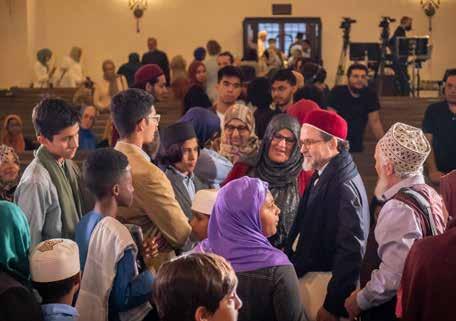
To conclude his talk, President Yusuf surprised everyone with a beau tiful poem that he penned for the occasion: “Be Like Ahmad: A Poem for the Beloved of God s.” The poem relates extraordinary exchanges between various creations of God, who alternately lament their abject ness in comparison to the Prophet s but are reminded of the blessing of serving the best of creation s. The poem ends with these lines:
The Mountains of Makkah called out: He loved us!
Madinah demurely whispered: He chose me.
And humanity cried: Nafsi! Nafsi! Me! Me!
And God said: Be like Ahmad s
And Ahmad said: Ummati! Ummati! My community!
And God replied: We will grant you, until you are content. Ð
34 president’s report 2022
President Yusuf meets with youth after his talk on mindfulness in prophetic practicei n a world riven by ideologies that deprecate tradition, religion no longer resonates but instead remains a problem to be mitigated, solved, or eliminated. Since Renovatio’s inception in 2017, the journal has put forward an editorial vision that insists on the primacy of God in relation to virtually any topic, from artificial intelligence to urban planning.
In 2022, Renovatio published conversations on myriad topics, includ ing the relationship between early Islam and the modern discourse on race; a Stoic solution for our environmental crisis; an essay on what idolatry looks like in modern times; an interview with an architect about how architecture can erode—or elevate—our values; and a revealing inquiry into how internet culture is producing a digital spiritu ality that points back at the self.
The mission of Zaytuna College’s flagship publication has attracted more and more scholars of different faith traditions, who vie to publish their work on a rich selection of topics.

Dr. Robert George, McCormick Professor of Jurisprudence at Princeton University and a contributor to the journal, says, “Renovatio is unique and indispensable. Every issue brings outstanding contemporary scholarship drawing on the wisdom of the Islamic, Christian, Jewish, and classical traditions. In our time, when wisdom is in especially short supply and foolishness and hubris abound, I look forward eagerly to each new issue of the journal. Renovatio is water in the desert.”
35 president’s report 2022
r enovatioShaykh Abdal Hakim Murad, dean of Cambridge Muslim College in the UK, notes the importance of Muslims to the restoration of sec ularized Europe and America, and he believes Renovatio is “the premier journal platforming America’s most important dialogue: the conversa tion with Islam.”
Chris Hedges, a Pulitzer Prize–winning writer and contributor, says, “Renovatio is a seri ous journal for serious thinkers. It examines not only the most important issues of our age, but the existential crisis that has given rise to the soul-crushing vapidity of modernity. It seeks in every issue to call us back to our better self.”
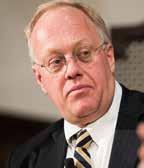

By the grace of God, Renovatio’s ambition to seek and publish writers committed to the wis dom of revelatory traditions gives the Muslim community an increas ingly important role in helping shape religious thought in America. Ð
o ur H istor Y books rarely, if ever, consider satanic influence on the world’s consequential events, but we know from scripture that the devil enthralls us and induces us to forget—and disobey—our Creator, and has done so from the beginning of human existence.
But believers in a living God were always mindful of the metaphys ical import of earthly experiences. In a compelling essay published in Renovatio’s newest issue, editor-in-chief Hamza Yusuf examines the rise of a victimhood culture through the lens of the devil’s game. The victimhood cul ture, he asserts, aims to decimate the lawbased dignity culture that marks most modern societies and to replace it with a chimerical utopia, hostile to the order and hierarchy that great religions establish for believers. “A strict adherence to Abraham ic morality has been deemed bigoted, hate ful, and unacceptable within the current zeitgeist,” he observes. “It seems to have happened quite suddenly, but for those with eyes and ears, it has been brewing in the devil’s cauldron since the very start of human life.”
36 president’s report 2022
Chris HedgesThe new issue, themed “Those with Authority Among You,” fea tures several pieces that reflect on the rule of law from various vantages, including Chris Hedges’ disconcerting yet essential description of how the cult of the self, fueled by corporate greed, undermines the rule of law and, ultimately, democracy itself; Imam Zaid Shakir’s multilay ered analysis of whether Muslims can produce a human rights regime authentically rooted in the Islamic tradition; Catholic philosopher Dr. Melissa Moschella’s lesson from the pandemic: that emergencies may require temporarily bypassing the rule of law, but legal predict ability must prevail for the common good; and Dr. Recep Şentürk’s argument that in Islamic law, “all human beings possess inviolability, regardless of their creed, color, class, or culture.” Ð
Purchase Renovatio’s new issue at the Zaytuna College Bookstore: bookstore.zaytuna.edu.
tH e b ookstore
o ne wa Y to view the Zaytuna Bookstore is to see it as a doorway to the College, for the space—both physical and virtual—and the prod ucts therein reflect the Zaytuna experience. And when people buy the curated selection of books and other gifts, they are supporting the Col lege itself.
Early in 2022, the bookstore welcomed a new influx of customers, sales, and energy from the launch of the First Command Book Club, the reading group for members of 12000 Strong hosted by President Hamza Yusuf. The bookstore has been an essential partner in the program; it offers all of the assigned books, including those difficult to find in the United States, as well as notebooks marked with the book club’s seal.
The bookstore now offers a year-long collection of gift sets in addition to the always-popular seasonal gift sets. During the twelfth of Rabi al-Awwal event, What Is Your Mind Full Of? Mindfulness in Prophetic Practice, the bookstore ran a pop-up gift set shop for visitors, which also proved successful, showing that Zaytuna’s supporters appreciate the thought put into curated gifts.
As creative director Khadija O’Connell puts it, part of her goal is to help the community worship and reflect with iĥsān, beauty and excel lence, something she tries to support by carefully choosing versions of “the core things that Muslims use.” She seeks out objects whose beauty elevates one’s experience of the world, not distracts from it.
37 president’s report 2022
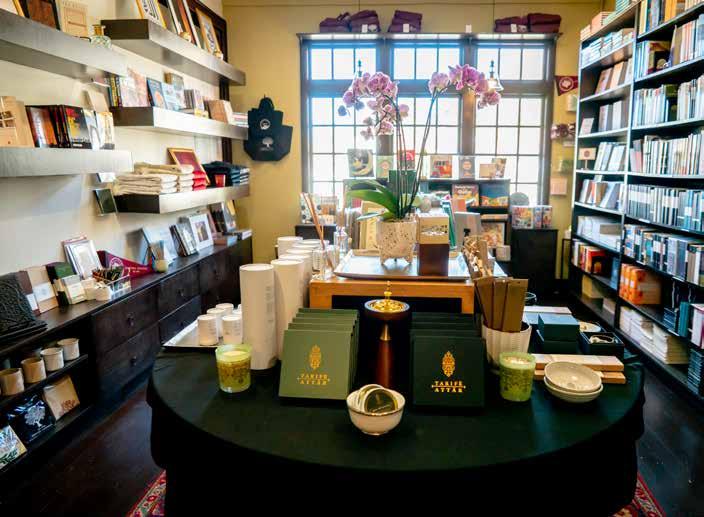
The store recently began selling hand-tooled and leather-bound muśĥafs, printed in the Ottoman script, and woven prayer rugs from Morocco. These link the Zaytuna community to historic Muslim crafts and trades from across the world, and O’Connell is intentional in pro viding beautiful and practical options at all price points.
As part of the College’s planned and ongoing campus improvements, the bookstore will be getting a new, expanded space in 2023 that will make it more directly accessible to visitors as well as create a seating area for customers to relax and reflect, deepening the bookstore’s role as the bridge between the campus and the wider community. Ð


wH en a delard of Bath, whose learning would help usher in the English Renaissance in the twelfth century, left behind a dull existence in Western Europe for a journey through the Muslim lands—or the lands of the Crusades, as they were called—he returned with unimag inable riches of knowledge.
Intellectual historian Dr. Jonathan Lyons, in a recent video for the Emir-Stein Center, relates how Adelard brought back Euclid’s geom etry, a detailed table of the movements of the stars and other major works of Arab astrology and astronomy, knowledge of the astrolabe, an early analog computer that could track time and establish geograph ic positions, and a rare text on chemicals that produce pigments. The House of Wisdom: How the Arabs Transformed Western Civilization illustrates Adelard’s story to show how prominently the Arabs figured in the flow ering of science in Europe. Dr. Lyons quotes Adelard as saying, “Of course, God rules the universe. But we may and should enquire into the natural world. The Arabs teach us that.”
“Of course, God rules the universe. But we may and should enquire into the natural world. The Arabs teach us that.”
40 president’s report 2022
The work is the latest in a string of notable videos by the Emir-Stein Center, a project of Zaytuna College with a mission to promote cultural and religious literacy. Produced in a lively style and narrated by promi nent scholars and other voices, the videos have been quite successful on YouTube, with the most popular—an introduction to the Qur’an by Pulitzer Prize-winner Dr. Garry Wills—reaching two million views.
A second video released this year is How to Argue about Religion and Never Lose by Jack Miles, a professor of English and religious studies at the University of California, Irvine, whose book God: A Biography won the Pulitzer Prize in 1996. He explains that arguments about religion are often resolved in one of three ways: through unyielding disagreement, which can lead to religious sectarianism and worse; through a mediat ed compromise, in which both parties agree they are at least partially wrong, which dilutes the power of religion itself; and through cheerful agreement that we’re all right, which does the same.
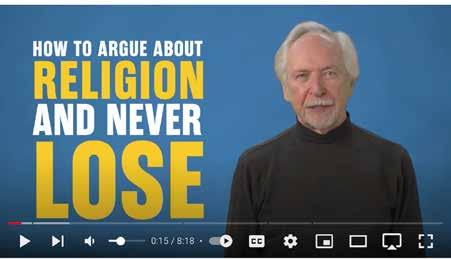
Dr. Miles offers a fourth way, one that aligns well with the Abraham ic approach to resolving religious disputes: indefinite postponement and deferral to the judgment of God, which allows unresolved issues to retain their consequences but also allows those who disagree to get along. It’s a lesson that encapsulates the mission of the Emir-Stein Cen ter itself: that we remain comfortable with our disagreements while re specting one another’s traditions. “I expect to die with many questions unresolved,” he says. “If we can live with that knowledge, then—with out telling each other any little white religious lies—maybe we can live together along the way without winning, without losing, but just as important, without abandoning even the most divisive questions.” Ð
41 president’s report 2022
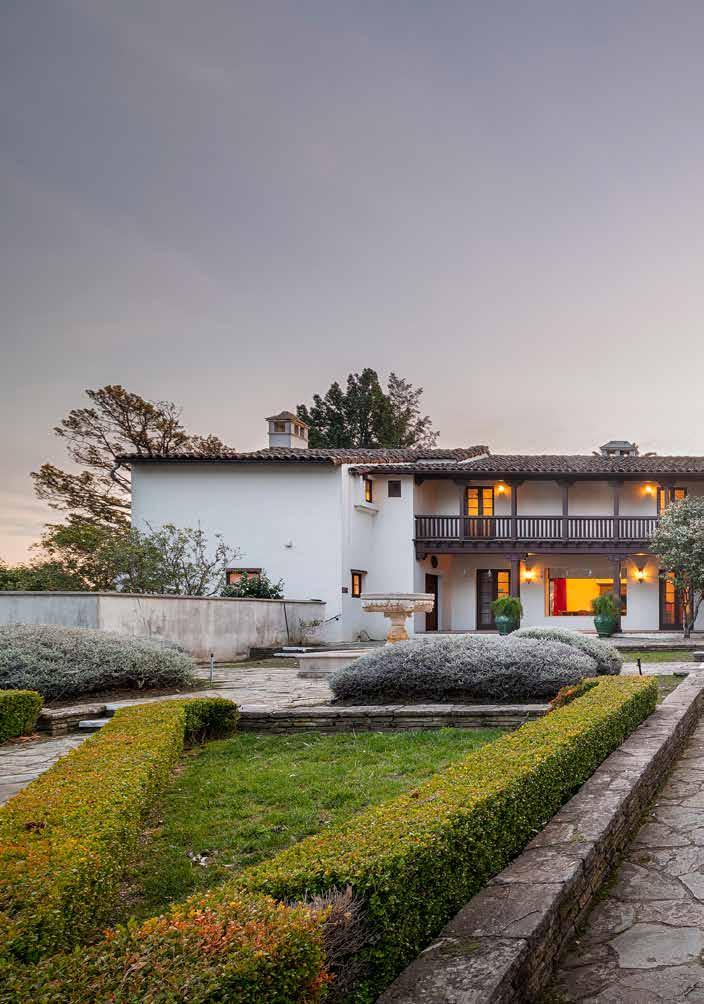

bY t H e gra C e of God and through the generosity of its supporters, Zaytuna College has continued to grow, beautify, and renovate its cam pus to fulfill the needs of its students, staff, and faculty.
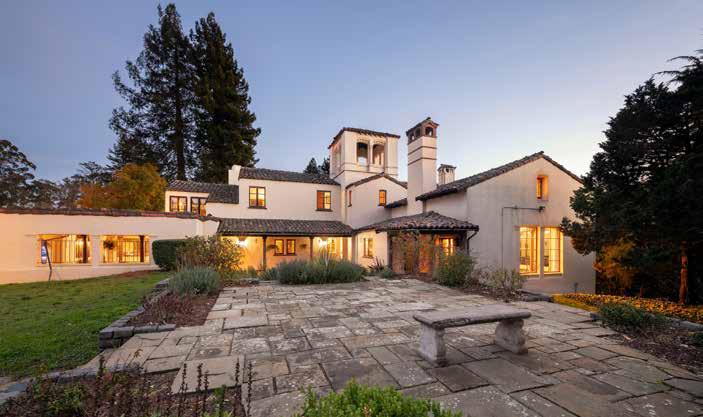
Zaytuna’s upper campus, an oasis of natural beauty, is a place where seekers of knowledge—the College’s faculty and students—can find refuge from the distractions and stresses of the world. The campus gardens are a space not only of beautiful and stirring spiritual reminders but also of learning and reflection. Faculty will sometimes take students onto the grounds to give practical demonstrations—for example, to il lustrate an astronomical concept—or simply to hold an outdoor class.
But the College’s leadership envisions that the whole campus can be come an attraction for more than Zaytuna’s students and scholars. “We want to make it a beautiful place, not just for locals, but for the Muslim community at large,” says JJ Botha, director of facilities and campus support services. “We want it to be a destination that everyone would want to see at least once in their life—that’s what we envision, a place of beauty and tranquility."
The College launched a key effort to further beautify the campus this year, engaging a landscape architect to develop a master plan in spired by concepts related to the Alhambra Gardens. Renovation and construction projects included new roofing for key buildings, addi
44 president’s report 2022
tional apartments dedicated to female MA students, addition al classrooms, and a dedicated prayer area in the auditorium, a design effort led by Feraidoon Mojadedi, the College’s events and volunteers manager.


Along with the ongoing im provements and renovations of Zaytuna’s upper campus, the College also began to imple ment an ambitious plan for its main lower-campus building, marked by its iconic brick tow er and the vast sanctuary space that hosts many public events. The MA program was tempo rarily moved to upper campus to allow for the construction of an academic library geared for MA students and the expansion of the Zaytuna Bookstore. Both the library and the bookstore are expected to be completed in 2023, God willing. Securing affordable housing for faculty and staff represents anoth er key element of the campus master plan. To this end, the College acquired a residential home near the upper campus and finalized plans to build a new home on an empty lot that it also acquired. A third ac quisition—a newly renovated, nine-unit apartment building on Martin Luther King Jr. Way, about a mile from lower campus—was also final ized in the fall semester, offering staff and faculty an affordable housing option. Meanwhile, Zaytuna’s existing apartment building on Le Conte Ave., currently shared by faculty, staff, and family-housing students, will soon undergo its own extensive renovation and updating. Ð
45 president’s report 2022
The nine-unit Berkeley apartment building purchased for staff and faculty housing Renovation and construction projects in 2022 included two apartments at the upper campus designated for female MA students
tH e i slami C f ood and Nutrition Council of America (IFANCA) and Zaytuna College have embarked on an exciting partnership that furthers the mission of establishing halal and ethical standards of the Islamic tra dition in the food industry. IFANCA has generously provided endowment support for the Zaytuna Center for Ethical Living and Learning (ZCELL), and the College aims to expand its permaculture garden by implementing an agro-ecological landscape design that is based on regenerative farming practices.
Zaytuna, under the leadership of President Hamza Yusuf, is working with the IFANCA team and leaders in the halal industry on a training process based on Islamic ethics and principles related to halal and tayyib. Dr. Muhammad Chaudry, the Council’s president and CEO, has generously offered Zaytuna students and graduates to in tern at the IFANCA headquarters. This exciting and growing partner ship will be mutually beneficial, God willing, to IFANCA and to Zay tuna’s long-term goal of establishing a sustainable permaculture garden and farm that provides both for the College and local community.
This summer, the orchards planted through ZCELL bore fruit,
46 president’s report 2022
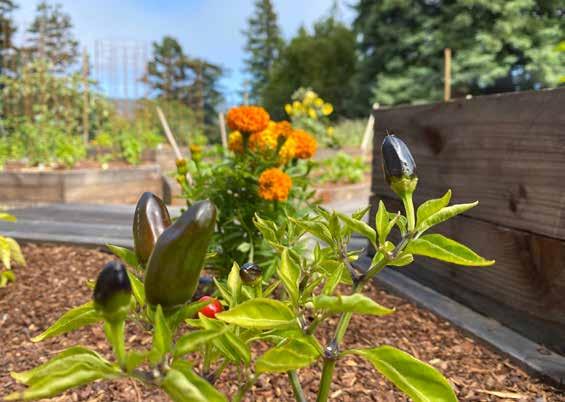 Part of the permaculture garden at Zaytuna
Part of the permaculture garden at Zaytuna
including seventy-five pounds of beautiful plums. The plums provided a learning opportu nity: under the direction of Dr. Cindy Ausec, students learned how to harvest the plums and make jam. She showed them the process of seeding, boiling, measuring sugar, and separat ing skin to produce the jam—and of course the proper canning process, including sterilizing jars. This practical learning experience, which produced lovely jam, is a lasting reminder of summer in these colder months.

In early fall, those on the Marin campus no ticed a swarm of wild bees around one of the trees in the orchard. This became an opportunity for an impromptu, exhilarating lesson about negotiating a wild hive in an area frequent ed by people. The students learned how to transfer the hive into the existing apiary, thereby avoiding potential harm while expanding the apiary, with all its benefits. The episode provided a living example of the importance of properly understanding the trusteeship humans have over nature.
ZCELL’s crops, orchards, and apiary form a special outdoor class room, and this year’s milestones give a glimpse of their full potential, which becomes more apparent with each passing semester and with each batch of students getting to know the Center for themselves. Ð
president’s report 2022
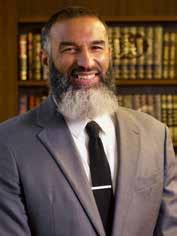
m an Y of z a Y tuna College’s oldest supporters recall the Brick-byBrick campaign, which helped raise the funds required to purchase the College’s first major campus building, the signature redbrick building on Le Conte Ave., and plant Zaytuna firmly on Berkeley’s Holy Hill.
President Hamza Yusuf and Imam Zaid Shakir traveled across the United States to promote the campaign, inspired by the prophetic statement, “A faithful believer to a faithful believer is like the bricks of a wall, each supporting the other.” The community enthusiastically responded to the call, supporting the burgeoning academic institution with donations that, in return, granted them bricks that they could ded icate in their or their loved ones’ names.
During the reception following the College’s 2022 commencement, President Yusuf unveiled commemorative plaques that memorialized each donor’s brick. Fittingly, the plaques have been prominently placed in the entryway of the building whose acquisition the donors made possible.
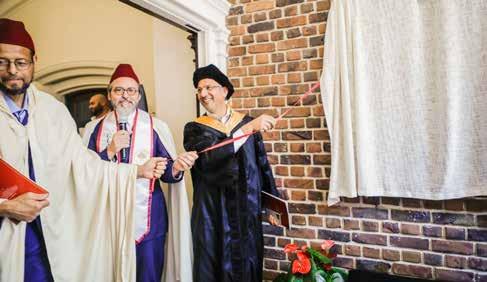
Zaytuna remains incredibly grateful for the supporters honored on the brick wall and those who continue to provide for the College, by God’s grace. As President Yusuf put it during the wall’s unveiling, “If your name is on there, I hope you find it and may Allah bless you. If it’s not on there, we’re still accepting donations! See the barakah in the brick, and see Islam’s college in the barakah.” Ð
48 president’s report 2022
The founders of Zaytuna College prepare to unveil the donor wallm an Y as P e C ts of Zaytuna College are rooted in constancy—the principles that buttress its educational mission, the sincere efforts of its students and faculty, the sustaining support of its well wishers and do nors—but change is also always a constant at the College. Not only do graduating students depart and new students arrive each year, the com plexion of Zaytuna’s staff periodically evolves.
The College bade farewell to two beloved staff members this past year: Jamal Barakat, director of development, and Faisal Hamid, director of admissions, both young professionals who gained rich expe rience at Zaytuna and accepted key leadership positions at Loyola Law School and Harvard University, respectively.
Their departures were softened by key additions to the administrative leadership: Noman Munif, head of institutional advancement, and Dr. Zahid Ahmed, director of technology.
Noman brings a strong background as a team leader in sales and marketing, espe cially in the start-up world. As an active member of the San Francisco Bay Area Muslim community and a long-time sup porter of Zaytuna, he possesses a keen sense of American Muslim philanthropy and is looking forward to the work ahead. “By the grace of God, and the dedication of its supporters, the College is in a financially healthy and stable state,” he says. “I hope our department can build on the success already achieved and provide a sustainable financial support base for the longer term.”

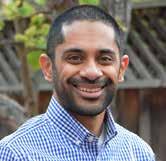
Dr. Zahid—a long-time Bay Area den tist—has extensive experience in IT, web development, and digital applications. His role is crucial to Zaytuna’s public profile as it gears up to expand its dig ital education offerings and build a robust web platform to accommo date the College’s rapid growth. He sees a forward-thinking technology strategy as essential for Zaytuna’s future. “Leveraging technology will allow us to better connect with our global community of supporters and lay a foundation for future educational initiatives,” he says. Ð
49 president’s report 2022
Noman Munif Dr. Zahid Ahmeda s z a Y tuna College continues to grow its academic programs, increase its student body, and acquire new properties for faculty hous ing, financial sustainability becomes paramount to its longevity as an established institution of higher education. A central tenet of Zaytu na’s five-year strategic plan focuses on exponentially growing its en dowment fund, a common feature of most long-standing colleges and universities.
By the grace of God, the College has nearly $7 million in endowed funds. The strategic plan calls for increasing that to $40 million by the end of 2026, God willing. While this may seem ambitious, the good news is that the College’s operational and academic infrastructure has rapidly grown in recent years, placing the College in a position to strategically steward large gifts and increase the size of its endowment to fund the College’s faculty, students, facilities, and operations in per petuity.
As a Muslim institution, Zaytuna College remains committed to the principles of the Islamic tradition, especially regarding financial mat
50 president’s report 2022
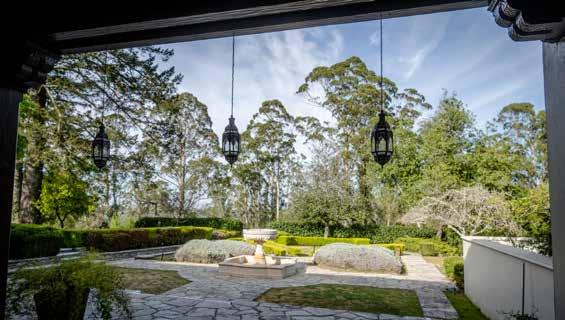
“When a person dies, his deeds die with him, except for three: charitable endowments, beneficial knowledge, and righteous children who supplicate on his behalf.” tH
e z a Y tuna e ndowment
und
ters. Every gift constitutes a sacred trust to steward the funds in an eth ical and transparent manner. The College’s endowment is invested with Amana Mutual Fund, administered by Saturna Capital, and the fund adheres to a sharia-compliant screening process. The College is also di versifying its endowment portfolio through real estate investment op tions that yield competitive returns on investment.
The College also adheres to the Uniform Prudent Management of Institutional Funds Act (UPMIFA) as set by California law. The Col lege’s Finance Committee sets the spending amount in accordance with UPMIFA and ensures that it is invested pursuant to the College’s investment policy for endowed funds. The assets of all endowed funds may be merged or pooled for investment and investment management purposes with the General Endowment Fund or other assets of the College. Fees and costs to administer and invest the fund will also be charged to the earnings of the fund in accordance with the policies and procedures of Zaytuna College and applicable California laws.
The Zaytuna College General Endowment Fund is an invested pool of funds whereby the accrued annual payout is designated toward provid ing the operational margin of excellence required to run the College at an optimal level. By making a gift to the Zaytuna General Endowment Fund, donors are directly supporting the long-term viability of the institution, which remains the greatest funding priority for the College.
The Zaytuna College General Endowment Fund directly supports the following key areas:
• Academic programs
• Student life
• Experiential learning
• Campus facilities
• Administrative staff
The purpose of an endowed scholarship fund is to recruit the best and brightest students from the Muslim community in the US and abroad by removing financial barriers. Donors may establish their own endowed scholarship fund, whereby the accrued funds from the principal invest ment can only be spent for student scholarships. The threshold for an individual scholarship fund begins at $25,000 and can be paid in annual installments up to a five-year period. Each academic year, the College’s Financial Aid and Fees Committee will identify eligible students to re ceive, in the fund’s name, an annual scholarship amount depending on the earnings of the fund. Endowed scholarship funds can be increased
51 president’s report 2022
by contributing gifts over time. As the principal increases, so too does the annual scholarship amount for eligible student recipients. Donors may also choose to give toward already established funds.
Endowed scholarship funds can be set up at two levels:
• A Partially Endowed Scholarship begins at $25,000 and can be increased with additional donations.
• A Fully Endowed Scholarship must have $750,000.
The purpose of endowed faculty chairs is to strengthen the academ ic programs at the College by recruiting and supporting notable pro fessors in key academic positions. The payout from the accrued funds can be spent on salary, benefits, research publications, and support staff, depending on the earnings of the fund.
The core faculty positions at Zaytuna College are in the following areas:
• Islamic Law and Legal Philosophy
• Islamic Theology
• Qur’anic Studies
• Grammar/Rhetoric (Arabic)
• Islamic Finance and Economics

• Grammar/Rhetoric (Western Trivium)
• Logic and Philosophy/Metaphysics
• Endowed Department Chair – starting at $5 million
Supports full-time salary with full research and publication funding as well as the administrative needs of the department
• Endowed Faculty Chair – starting at $3.5 million
Supports full-time salary and partial research and publication funding
• Endowed Professorship – starting at $2 million
Supports partial salary of a distinguished professor
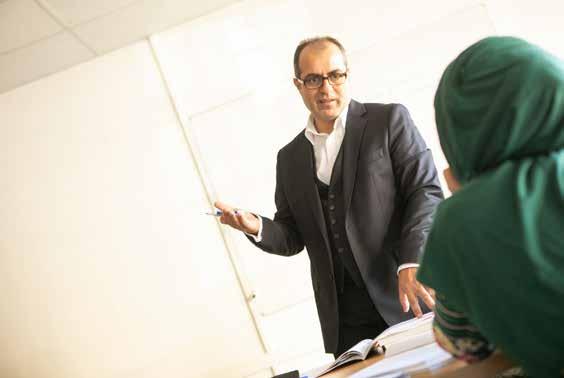
• Faculty Support Endowment – starting at $100,000
Supports research, development, and publications of qualified faculty members
To recognize the transformational impact of establishing an endowed fund, the naming rights of endowed funds are available to donors in consultation with the Office of the President. Final approvals of all en dowed chairs are confirmed by the Board of Trustees and must abide by the ethics and principles of the College. The College reserves the right to change the name of the fund should the Board of Trustees determine in its reasonable opinion that circumstances have changed such that the fund’s name would adversely impact the reputation, image, or integrity of the College. Ð
b oard of t rustees
Pervez Qureshi, b oard C H air | Syed Mubeen Saifullah, b oard s e C retar y | Faraz Ahmed | Dilshad Dhanani | Dr. Marianne Farina | Masood Khan | Dr. Suhail Obaji | Dr. Farah Rana e xe C utive t eam
Dr. Hamza Yusuf, President Dr. Aisha Subhani, v i C e President | Dr. Omar Qureshi, Provost f a C ult Y Shaykh Talal Ahdab, l e C turer | Dr. Abdullah bin Hamid Ali, a sso C iate Professor | Imam Tahir Anwar, l e C turer | Dr. Ali Ataie, a sso C iate Professor | Dr. Cindy Ausec, a djun C t f a C ult Y , aC ademi C s u PP ort Center Coordinator | Dr. Rabia Bajwa, a ssistant Professor | Dr. Hatem Bazian, Professor | Qari Amar Bellaha, l e C turer | Dr. Phillbert Cheng, l e C turer | Dr. Fadi Elhin, a sso C iate Professor , d ire C tor of t H e a rabi C Program Dr. Uzma Husaini, a djun C t f a C ult Y | Dr. Youssef Ismail, a ssistant Professor | Dr. Lawrence Jannuzzi, a djun C t f a C ult Y | Shaykh Faraz Khan, l e C turer , s enior r esear CH f ellow | Ustadh Yusuf Mullick, l e C turer , d ire C tor of t H e s ummer a rabi C Program Dr. Francisco Nahoe, a ssistant Professor | Dr. Jawad Qureshi, a sso C iate Professor, d ire C tor of g raduate s tudies | Dr. Omar Qureshi, a ssistant Professor , Provost | Dr. Hasan Spiker, l e C turer | Shaykh Mahsuk Yamac, l e C turer , d ire C tor of ma t ea CH ing and l earning
Zaytuna College aims to educate and prepare morally committed professional, intellectual, and spiritual leaders who are grounded in the Islamic scholarly tradition and conversant with the cultural currents and critical ideas shaping modern society.
